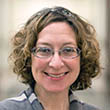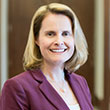How Economists Make a Difference
The past 50 years saw significant improvement in women’s representation in economics. That’s according to the most recent (May 2020) report from the American Economic Association’s Committee on the Status of Women in the Economics Profession. For example, the share of full professors in Ph.D.-granting econ departments who are women reached an “all-time high” of 14.5% in 2019.
But the report is clear: Huge gaps remain. At the start of the pipeline—the undergrad level—the share of women econ majors (33.5% at the schools the committee examined) is far below the 55% share of women undergrads overall. And the pipeline to a Ph.D. is leaky, with women disproportionately exiting (or perhaps never entering) the assistant professor ranks before coming up for tenure.
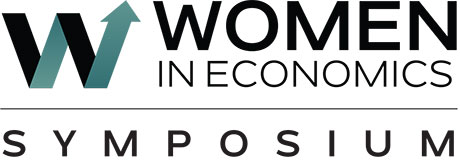
That’s why, in late February, it was encouraging to see hundreds of young women—including high school and college students—dialed in to the 2021 Women in Economics Symposium to learn all about econ: What you can do with a bachelor’s or master’s degree. The different careers you can enjoy. Health care, environmental and behavioral economics. Working in banking, finance and forecasting. Overcoming imposter syndrome. Asking tough questions and uncovering the answers through your own unquenchable curiosity.
You name it, they covered it. (“They,” meaning an impressive lineup of about 40 women panelists working in many arenas, from the private sector to academia to the Fed.) Keynote talks by Abigail Wozniak on Feb. 17 and Lisa D. Cook on Feb. 18 brought equal parts inspiration and intellectual rigor.
“This program was inspiring! The theme really says it all—'making a difference in the world through economics.’ Our speakers and panelists nailed it. Young women left this symposium with concrete examples of how women working in economics are making a difference in so many areas,” said Mary Suiter, St. Louis Fed economic education officer, who also served as a moderator.
“Our keynote speakers provided valuable ideas about the framework economics provides for using data, investigating issues, and solving problems so that you can make a difference.”
Scroll on for highlights!
Changing Minds Using Data
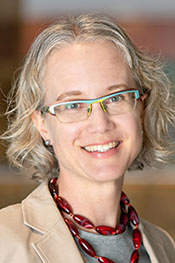
Abigail Wozniak,
Minneapolis Fed
Abigail Wozniak is the director of the Minneapolis Fed’s Opportunity and Inclusive Growth Institute and a senior research economist.
The power of data to change minds is “a really important channel through which economists have the potential to make a difference,” she said in her keynote speech.
Why is changing minds important?
“If we’re not changing minds at least sometimes, then we’re proceeding from some kind of basis of really, frankly, fantasy, because that would suggest that we all know all the answers already,” she said. “So, we have to have some of that turnover in what we think.”
To illustrate the power of changing minds with data, Wozniak gave an example of an early idea about why Black and Latino Americans had higher COVID-19 infection and mortality rates than white Americans. A theory that gained popularity last summer was that underlying health disparities were causing the virus to be more lethal for those populations, she explained.
Wozniak cited work from researchers, including one of her colleagues at the Opportunity and Inclusive Growth Institute, who used cellphone data in New York City to determine that economic circumstances—work, commuting and living arrangements—were feeding into infection rate differences much more than underlying health disparities. The work demonstrates a way in which data were used to change our perception about how the pandemic was unfolding, Wozniak said.
Resolving Puzzles that Could Improve People’s Lives
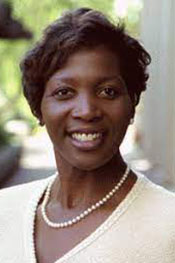
Lisa D. Cook,
Michigan State University
During Lisa D. Cook’s keynote on how economists make a difference in the world, she focused on puzzles. Cook is a professor of economics and international relations at Michigan State University and serves as director of the American Economic Association Summer Program.
“Economists love puzzles. … Many of us are particularly motivated by puzzles that, if resolved, could improve people’s lives,” she said.
As a trained macroeconomist, she thinks about the overall health of the economy and how all the pieces of the economy connect, she said. She is also interested in living standards, and how well each country, family or person is doing.
As an example, she discussed innovation, which she said is fundamental to economic growth. She has investigated puzzles as to why innovation may not have been happening in a certain country or during a certain period of time, despite laws protecting intellectual property. Through her work, she found that other things are also important for innovation, such as contract enforcement and violence prevention.
“Making sure that we can do and participate in innovation could actually change people’s lives. We could get more invention and innovation and raise living standards by doing so,” she said.
Women in Economics Symposium and Podcast Series
Catch interviews from women making a difference. Subscribe to the Women in Economics Podcast Series.
Many symposium presenters are among dozens of prominent women featured in the Women in Economics Podcast Series. The series and the symposium launched in 2018. Both are designed to to inspire young women and underrepresented minorities who may be interested in econ, and to encourage those pursuing a degree to persist—that “pipeline” referenced by the committee.
Amid the pandemic’s challenges, Suiter’s team opted to hold the symposium virtually in 2021. This enabled it to expand geographically and to welcome high schoolers in addition to college students. Young people signed up from all over the world, including students at historically Black colleges and universities, military institutions, and private and public schools.
“In the past, a real benefit of the Women in Economics Symposium was the opportunity for participants to network. So, we were concerned about hosting it virtually,” Suiter said.
“But there were some tremendous benefits—we were able to host dozens of women speakers and panelists from throughout the country. We drew more than 900 participants from across the country, too. The breakout sessions were great, and I’m already hearing stories of women connecting after the program to network and mentor.”
To all those who attended or expressed interest, thank you. We hope to see you in 2022.
This blog explains everyday economics and the Fed, while also spotlighting St. Louis Fed people and programs. Views expressed are not necessarily those of the St. Louis Fed or Federal Reserve System.
Email Us


